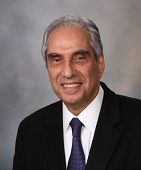Article
What is the Role of Surgery in the Management of Patients with Diabetes?
Author(s):
Several studies have shown good results with Roux-en-Y gastric bypass and laparoscopic gastric banding when combined with lifestyle modifications in severely overweight patients with type 2 diabetes.

How important are lifestyle modifications in reducing cardiovascular events in patients with type 2 diabetes? Are higher glucose levels associated with dementia? Is bariatric surgery effective in severe obesity? What is the role of diabetes in bariatric surgery?
Hossein Gharib, MD, MACP, professor of medicine at the Mayo Clinic College of Medicine in Rochester, MN, answered these and other endocrine-focused questions during a journal article review session at the American College of Physicians Internal Medicine 2014 annual meeting held in Orlando, FL.
In a randomized, multicenter trial examining whether lifestyle changes favorably affected cardiovascular morbidity and mortality, researchers followed overweight, diabetic patients for 10 years, monitoring weight, waste circumference, physical fitness, and glycated hemoglobin and found the intervention group achieved a 7 percent or greater loss and improvements in physical fitness and HbA1c. Cardiovascular events were not improved and the study was discontinued early.
“Lifestyle modification is still useful. Complications are less,” Gharib said. “Lifestyle changes cause no harm, offer modest benefit, and should be pursued” for overweight patients with diabetes.
A prospective, community-based cohort study with 2,067 participants who did not have dementia suggested higher glucose levels are a risk factor for dementia even in people without diabetes. Participants with a mean age of 76 years were followed for a median of 6.8 years; 524 of them developed dementia.
Studies like this demonstrate “there is a need to evaluate and carefully monitor hyperglycemia in the elderly,” Gharib said.
A multicenter, observational cohort study investigated medium-term outcomes for and complications of bariatric surgery in the severely obese, a term Gharib prefers to “morbidly obese,” which patients find offensive. Researchers followed for three years 1,737 patients who underwent a Roux-en-Y gastric bypass (RYGB) and 610 who had a laparoscopic gastric banding (LAGB).
The three-year median weight loss after the RYGB was 31.5 percent; after LAGB it was 16 percent. Partial diabetes remission was achieved in 67.5 percent of the RYGB cohort and in 28.6 percent in the LAGB group. Dyslipidemia resolved in 62 percent of the RYGB group and 27 percent of the banding group.
“Roux-en-Y is a more dramatic surgery and more effective,” Gharib said.
Adverse effects and the need for additional operations were common. However, overall, the treatment was satisfying and will be the subject of more studies, Gharib predicted.
Gharib prefers the name “metabolic surgery” for the procedures, because it reduces weight, causes diabetes remission, and improves hyperlipidemia.
In a multinational, randomized controlled trial involving 120 patients with diabetes mellitus and a body mass index ranging from 30 to 39.9, all patients underwent lifestyle modification and intensive medical management. Half of the patients were randomized to receive a RYGB. Researchers compared HbA1c levels, LDL cholesterol, and systolic blood pressure.
“The data shows better results after Roux-en-Y,” Gharib said. “HbA1c improved, and there was a significant weight reduction.”
However, the surgical group experienced a higher complication rate, and one patient became disabled as a result of a brain injury.
“The long-term safety and efficacy needs to be determined,” Gharib said. “Surgical treatment for diabetes seems to be an evolving process.”
Diabetic surgery seems to work, he added, but should serve as an adjunct to intensive medical management, not replace it. The surgery can be offered to moderately obese patients with type 2 diabetes.
“The results are somewhat encouraging, and the study is noteworthy,” Gharib concluded.




